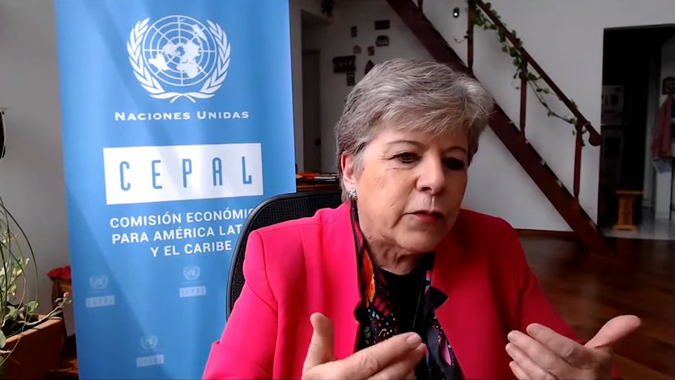Alicia Bárcena: Foreign Direct Investment is at the Center of the Post-Pandemic Recovery Plan
ECLAC’s Executive Secretary participated in the INEGI high-level seminar in Mexico, in which she underscored that FDI will play a fundamental role in promoting the creation of formal jobs and reactivating economic activity.

Foreign Direct Investment (FDI) is at the center of the recovery plan in the aftermath of the pandemic, particularly to promote the creation of formal jobs and reactivate economic activity, said Alicia Bárcena, Executive Secretary of the Economic Commission for Latin America and the Caribbean (ECLAC), during a high-level seminar organized by Mexico’s National Institute of Statistics and Geography (INEGI).
The meeting entitled Measuring quality in Foreign Direct Investment: challenges and opportunities brought together distinguished specialists from multilateral organizations such as the International Monetary Fund (IMF), the United Nations Conference for Trade and Development (UNCTAD), the Organization for Economic Cooperation and Development (OECD), and ECLAC, in addition to Mexico’s Vice Minister of Foreign Trade, Luz María de la Mora; the Chair of the INEGI Board of Directors, Graciela Márquez; and senior representatives from the Mexican Ministry of Economy and the Banco de México (central bank).
ECLAC’s Executive Secretary was in charge of closing the meeting with a summary of all the issues discussed, among which she stressed the importance of FDI to promote changes in the productive structure of the region’s economies. “The analyses carried out since 1995 show that FDI in most Latin American and the Caribbean countries has not produced substantial changes in the productive structure in the region, because it has not been interlinked with those concerning production in development,” she remarked.
“There is no evidence to suggest that FDI has contributed to a change of direction in the development model in the region because many inflows go the sectors where transnational enterprises have played a prominent role for decades,” she added.
Alicia Bárcena explained that in 2020, FDI inflows in the region fell by 34.7%, while in the first semester of 2021 – considering seven of the main recipient countries – FDI inflows recovered from the decline of last year, but the recovery is not sufficient to overcome the impacts of the contraction.
“ECLAC is especially interested in analyzing the quality of FDI in order to understand its potential to promote progressive structural change through a big environmental push toward sustainability. We also believe that FDI quality indicators must give attention to the sustainability dimension”, she said.
In this sense, she underscored the joint project that ECLAC has been involved in since mid-July with the Global Economic Intelligence Unit of Mexico’s Ministry of Economy to carry out comprehensive measurements and analyses of the quality of FDI and its impact on its economy.
Bárcena remarked that a secondary objective of this project is the design of a benchmark prototype for measuring the quality of FDI in other countries in Latin America. “This collaboration allows us to start a broad discussion among FDI experts to enrich the concept of FDI quality in Mexico. The project will also benefit from highly relevant information from diverse administrative sources that will allow us to qualify the FDI inflows,” she pointed out.
ECLAC’s Executive Secretary also said that ECLAC has run different studies on the impacts of investments from specific countries. For instance, it has identified that investments from the European Union have supported growth in strategic industries, such as the renewable energy sector in Latin America. It has also noted that investments from China have been concentrated in extractive industries and energy.
“The results achieved over the decade underscore the need to rethink the role of FDI in supporting sustained growth with greater social equality and environmental sustainability. The pandemic highlighted this need, given that FDI inflows are scarcer, and it is more important than ever that they support activities that enable long-term sustainable development,” she said.
“We need more initiatives like INEGI’s in the countries in Latin America and the Caribbean. With better data we enable better analysis and therefore, better policy recommendations for countries, so they can attract FDI that supports their development objectives and control the investments that can be harmful to their long-run sustainable development,” Bárcena remarked.
Subregional headquarter(s) and office(s)
Subregional Headquarters, MexicoType
Country(ies)
- Latin America and the Caribbean
- Mexico
Related link(s)
Contact
Public Information Unit
- prensa@cepal.org
- (56 2) 2210 2040